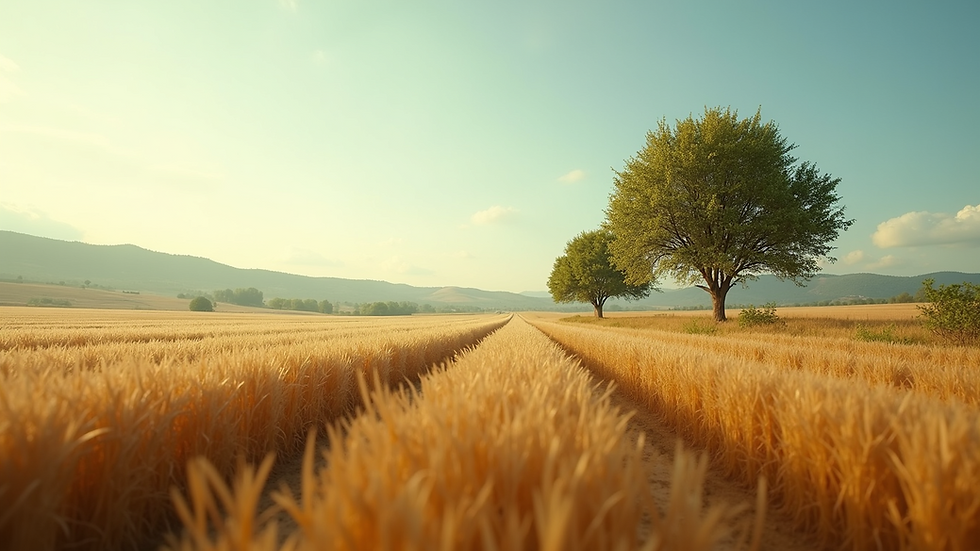The Benefits of Raising Free-Range Farm Animals
- alpacasjilliby
- May 31, 2025
- 4 min read
Raising farm animals has been a practice that many cultures have cherished for centuries. In recent years, the idea of keeping animals as free-range has gained momentum, encouraging farm owners and potential farmers alike to rethink their livestock practices. Not only are free-range animals healthier and happier, but they also contribute to a sustainable ecosystem. In this blog post, we will explore the various benefits of raising free-range farm animals, from environmental impacts to animal welfare, and include practical steps to get started.
The Importance of Free-Range Animals
Free-range farming refers to raising animals with substantial outdoor access. Unlike conventional farming methods that confine animals to small cages or pens, free-range systems allow for more natural behaviors and better living conditions. One of the main benefits of this approach is improved animal health. Studies have shown that animals allowed to roam freely are less stressed and more active, resulting in better overall health.
Benefits include:
Decreased incidence of disease
Lower veterinary costs
Better growth rates and quality of produce, such as eggs and meat
Furthermore, farm-fresh products from free-range animals often have enhanced flavor and nutritional content, making them a preferred choice among consumers.

A Closer Look at Animal Welfare
Raising free-range animals not only benefits producers but significantly enhances animal welfare. In typical farming practices, animals are often kept in crowded conditions, which can lead to physical and emotional stress. In contrast, free-range environments enable animals to express their natural behaviors, such as foraging, nesting, and social interaction.
Research from animal welfare organizations has indicated that free-range settings can lead to:
Lower levels of anxiety and aggression in animals
Higher rates of reproductive success
Enhanced connection to their natural habitat
These conditions can be particularly important for species like chickens, pigs, and goats, which thrive on social interaction and activity.

Can I Free Range Guinea Fowl?
Yes, you can free-range guinea fowl! These unique birds not only have substantial outdoor wandering capabilities but also contribute positively to pest control on a farm. They are natural foragers, which means they consume insects, ticks, and weeds, aiding in maintaining a balanced ecosystem on your farm.
To successfully raise free-range guinea fowl, consider the following tips:
Shelter: Provide a safe coop where they can roost during the night.
Fencing: Ensure a secure perimeter to protect them from predators.
Space: Allow them to roam in gardens or fields where they can forage freely, contributing to pest control and pasture management.
Educate Yourself: Learn about their behavior and needs to create an optimal environment.
You can find more information about raising these birds by checking out this article on free-range guinea fowl.

Enhancing Biodiversity
Free-range farming systems contribute significantly to biodiversity on farms. When farm animals are allowed to graze freely, they help fertilize the soil with their droppings, which can lead to improved crop growth. Additionally, these practices create habitats for wildlife and help with ecosystem sustainability.
Incorporating free-range techniques can:
Encourage a variety of plant species to flourish
Support local wildlife
Reduce soil erosion through better root structure from diverse plants
This practice can play a vital role in combating climate change by enhancing carbon sequestration. Biodiverse farms that raise free-range animals not only support the economy but also promote a healthier planet.
Practical Steps to Begin Raising Free-Range Animals
If you're considering transitioning to a free-range farming model, here are some practical steps to get started:
Choose the Right Animals: Select breeds that are well-suited for free-range living. Consider chickens, goats, ducks, and guinea fowl, depending on your farm's goals and environment.
Create a Safe Environment: Ensure your farm is predator-proof. A secure coop, as well as a spacious outdoor area, is crucial for the safety of your animals.
Design Rotational Grazing Plans: Implement a rotational grazing system to allow pasture recovery and sustainable land use. This method prevents overgrazing and maintains healthy pastures for your animals.
Invest in Infrastructure: Provide shelter, water, and feeding stations. Developing appropriate infrastructure will ensure that your animals thrive in a free-range setting.
Educate Yourself: Attend workshops, read books, or follow blogs that focus on holistic farm practices and animal behavior. Knowledge is critical in ensuring the health and success of your free-range farming operation.
Monitor Animal Health: Regularly check on your animals for signs of illness or distress. A proactive approach to health management can help maintain a thriving farm.
Promote Community and Networking: Engage with other free-range farmers. Joining a community can provide valuable insights and help you navigate challenges more effectively.
By taking these actionable steps, you can create a successful free-range animal system that benefits both your livestock and the environment.
Final Thoughts on Free-Range Farming
Raising free-range animals offers immense benefits for animal welfare, environmental sustainability, and overall farm productivity. By embracing free-range practices, you are not just contributing to a healthier ecosystem; you are also offering your animals a better quality of life. Whether you are a seasoned farmer or a passionate beginner, the transition to free-range farming can be a rewarding journey.
By cultivating a free-range environment, you'll witness happier, healthier animals and discover the numerous advantages that come with this thoughtful approach to farming. As you embark on this path, remember that every step you take contributes to a more sustainable future—both for your farm and the planet.



Comments